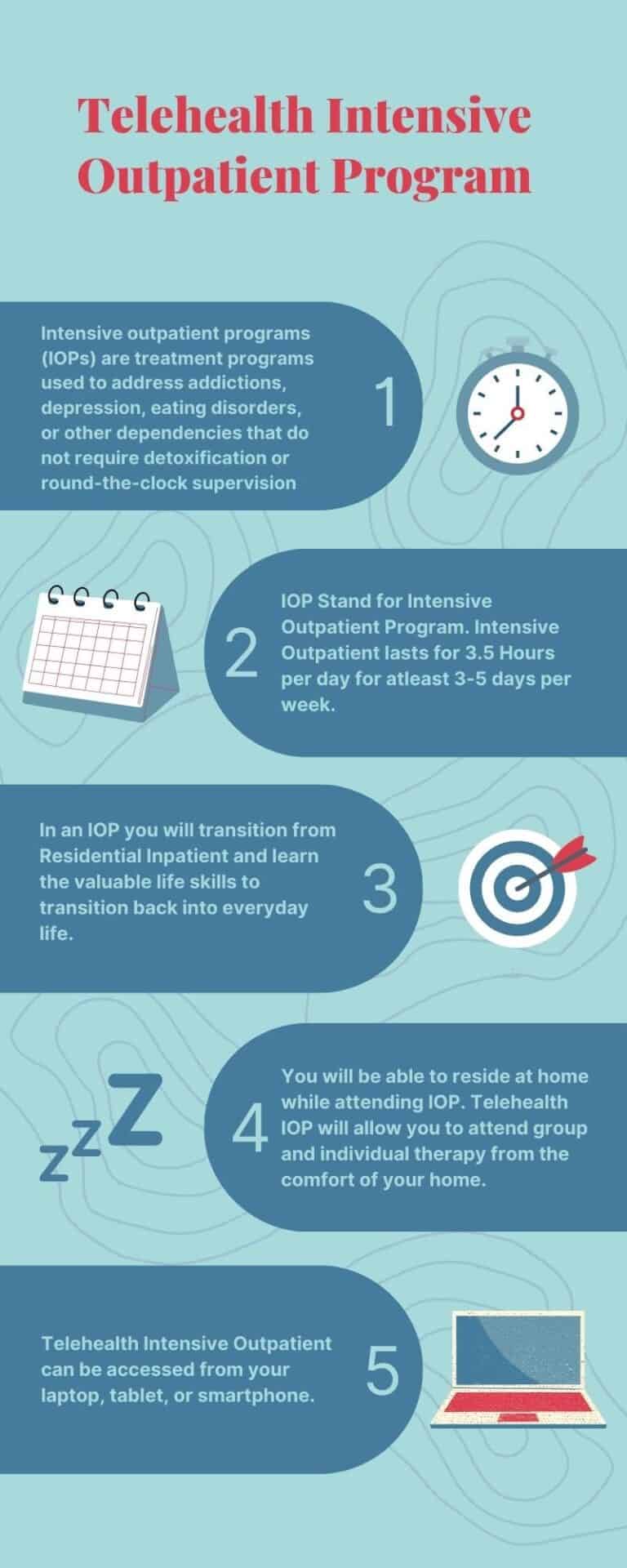Navigating the Intricacies of Twin Diagnosis Therapy Within an Extensive Outpatient Program Establishing
In the world of mental wellness and dependency therapy, the crossway of dual medical diagnosis provides a nuanced difficulty that requires a detailed and customized method. Within the boundaries of an Extensive Outpatient Program (IOP) setting, the complexities of resolving co-occurring psychological health problems and compound use disorders require a delicate equilibrium of proficiency and resources to navigate. The assimilation of evidence-based techniques, collaborative efforts among multidisciplinary groups, and an eager understanding of the special requirements of each person are important components in efficiently handling double diagnosis within an IOP framework. By discovering the intricacies of dual medical diagnosis treatment within this intensive outpatient context, a more clear course arises in the direction of holistic and sustainable recuperation for those coming to grips with these linked obstacles.
Dual Diagnosis Introduction
What is the value of comprehending twin diagnosis in psychological health therapy? It is crucial to acknowledge and resolve this comorbidity as it can substantially affect the performance of psychological health and wellness treatment.
Understanding twin medical diagnosis is necessary as it calls for an extensive and incorporated strategy to treatment. By recognizing the interplay in between material use and psychological health, doctor can customize interventions to satisfy the one-of-a-kind demands of each person. This alternative strategy not only addresses signs and symptoms yet likewise targets underlying aspects that add to the dual diagnosis.
Moreover, unattended double medical diagnosis can bring about a cycle of relapse and aggravating mental wellness signs and symptoms. By recognizing the intricacy of double medical diagnosis and giving specific treatment, medical care specialists can support people in attaining lasting recovery and enhanced mental well-being.
Tailored Therapy Strategies
Identifying the intricate interaction in between substance use conditions and mental wellness conditions, the advancement of tailored treatment plans is extremely important in addressing the complexities of dual diagnosis in mental health treatment. Tailored treatment plans are customized methods that take into consideration the special needs, obstacles, and goals of individuals dealing with twin diagnosis. These plans are developed collaboratively by a multidisciplinary group of specialists, including psychoanalysts, psychologists, social workers, and dependency professionals, to guarantee detailed and integrated treatment.
Tailored therapy plans normally involve a combination of treatments, drugs, and behavior treatments that target both the material use disorder and the mental health and wellness condition simultaneously. These strategies might include cognitive-behavioral therapy, dialectical actions therapy, medication-assisted treatment, specific therapy, team therapy, and family members treatment, to name a few evidence-based interventions. By tailoring therapy strategies to specific scenarios, customized plans can attend to the source of double medical diagnosis, advertise long-lasting healing, and boost overall high quality of life for individuals fighting with co-occurring disorders.
Integrated Treatment Technique

By integrating social treatments like family members treatment, vocational support, and area resources, the therapy becomes much more holistic and try this web-site tailored to the person's particular requirements. On the whole, an incorporated care strategy in dual diagnosis treatment within an extensive outpatient program setup aims to offer thorough, effective, and personalized treatment to people encountering co-occurring problems (Intensive Outpatient Program (IOP)).
Obstacles in IOP Setting
In the context of twin medical diagnosis therapy within an extensive outpatient program, navigating the complexities of co-occurring substance use problems and psychological health and wellness conditions presents substantial obstacles. Among the main obstacles in the IOP setting is the control of treatment between mental health and wellness professionals and drug abuse experts to guarantee an extensive treatment approach. This calls for efficient communication, collaboration, and a deep understanding of how these problems communicate and influence each various other.
Moreover, the changing nature of substance usage problems and psychological health problems adds another layer of intricacy - Intensive Outpatient Program (IOP). Clients in an IOP might experience unexpected changes in their signs or compound yearnings, requiring timely intervention and change of treatment approaches. Balancing the strength of therapy and assistance while enabling clients the versatility to handle their daily duties can be a delicate stability to maintain
In addition, dealing with preconception and resistance to therapy within the IOP setup can impede progress. Some people may be hesitant to divulge their dual medical diagnosis or may feel embarrassed, hindering their interaction in the healing process. Getting try this website rid of these obstacles necessitates a helpful and non-judgmental environment that cultivates depend on and openness.

Collaborative Expert Initiatives

Collaborative efforts likewise expand to normal interaction and information sharing among team members to make sure a natural therapy approach. Ultimately, a united front of experts working with each other improves the performance of twin medical diagnosis therapy within an extensive outpatient program.
Conclusion
To conclude, effective dual diagnosis therapy within an extensive outpatient program setup needs tailored treatment strategies and an integrated care strategy. Difficulties might develop in this setting, yet collective efforts among experts can assist browse these complexities. By attending to the unique needs of people with co-occurring psychological wellness and material utilize conditions, IOP programs can offer detailed and alternative like support recuperation and total wellness.